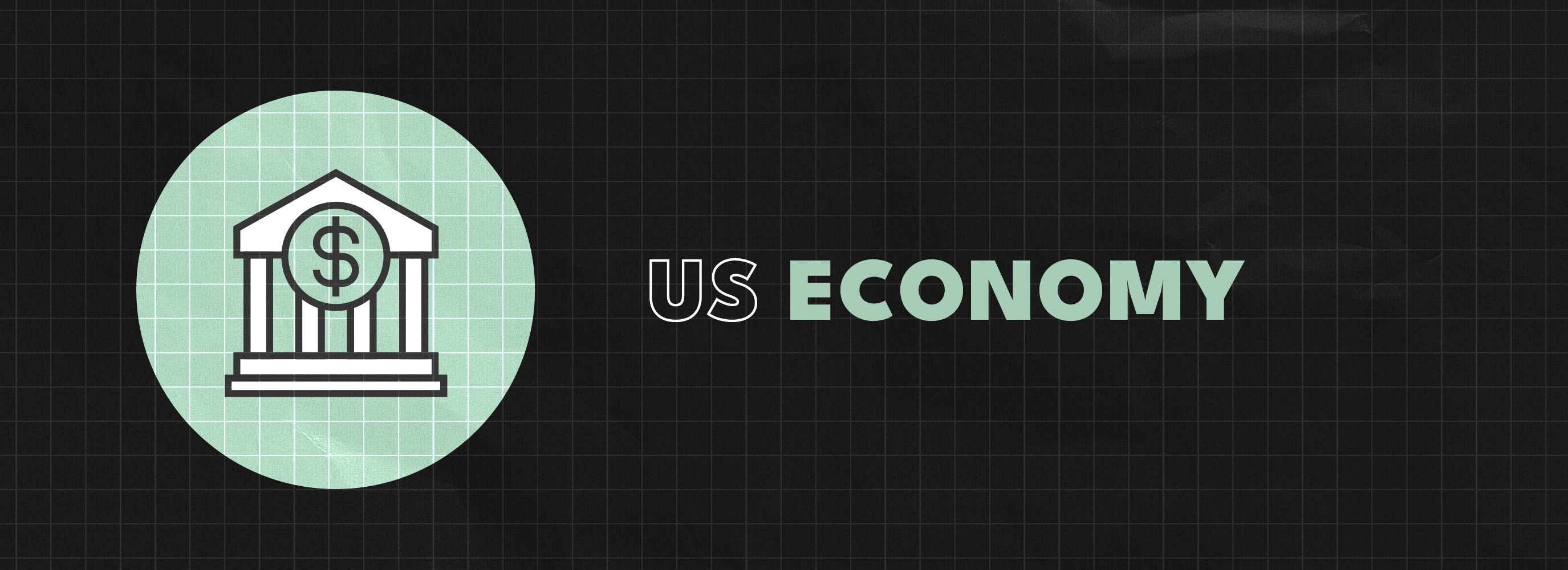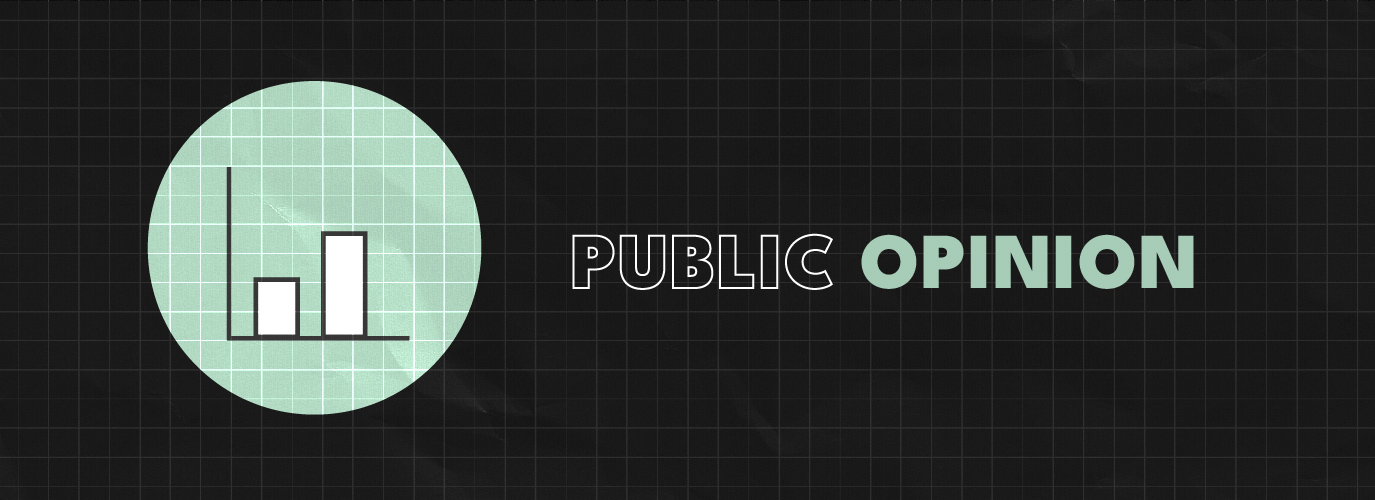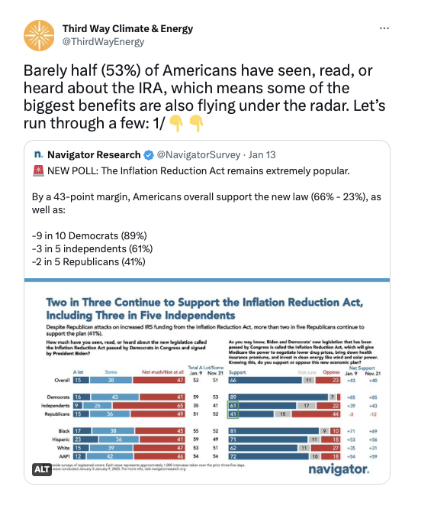On the Grid: American-Led Clean Energy 1/27/23

Click HERE to subscribe to this weekly newsletter.
America’s clean energy transition is well underway. As the White House’s Brian Deese, John Podesta, and Jake Sullivan wrote in a guest essay this week for The Economist, this is also reaching far beyond our borders. Delivering affordable and reliable clean power is not just about building energy security, it's patriotic –as Third Way’s Rachel Reh and Aliza Astrow note in The Hill that’s something that policymakers should not shy away from.
In this week’s On the Grid, we outline ways we can accelerate American clean energy by overcoming some big challenges and securing and maintaining leadership.

Last week, the US reached its borrowing cap of $31.4 trillion. The US Treasury is deploying short-term “extraordinary measures” to keep the government running and markets calm through the next few months. Unless Congress authorizes to increase or suspend the debt ceiling, then the tap will run dry, and markets will plunge. Republican lawmakers have remained adamantly opposed to this and instead hope to pass a draconian budget that would try to require dramatic cuts to discretionary spending, including education, healthcare, energy innovation, and national defense.
As Third Way’s Economics Team lay’s out, defaulting on our loans and obligations would be catastrophic for the US economy. But what does this mean for the Biden Administration’s clean energy agenda? Here’s a quick snapshot:
- The cost of clean energy capital will skyrocket, putting a premium on the infrastructure we need to quickly transition to safer and more reliable energy.
- The federal agencies–and workers–deploying clean energy programs, investments, and tax credits will be caught in the crosshairs of Republican-led spending cuts.
- The shockwaves of hitting the debt ceiling will reverberate across global financial markets, plummeting confidence in American leadership and compromise our competitive edge at the precise moment everyone should be betting on America’s clean energy economy.

This week The Washington Post reported on how Rosatom, the Russian state-owned nuclear conglomerate, played a major role in the Russian military’s illegal seizure of the Zaporizhzhia nuclear power plant and circumventing international sanctions to help re-arm the Russian military. As a key supplier of nuclear technology, infrastructure, and fuel to the global civilian nuclear industry, including the US, Rosatom’s, and Russia’s, influence has proven difficult to circumvent.
We’ve mapped it out: demand for nuclear energy is only growing, both here and in Europe. With the right technical leadership, legislative support, and regulatory framework in place, the US is well-positioned to serve this expanding market and edge authoritarian states like Russia out of the arena. Getting to this point will take a lot of work–you can read our latest policy recommendations here–but more than anything, we need a renewed sense of urgency in Washington to get the job done.
For a deeper dive on Rosatom and the opportunities for American nuclear, check out this Twitter thread from Josh Freed, Senior Vice President for Third Way’s Climate and Energy Program.

How do we most effectively communicate the importance of a clean energy transition to a broad coalition of supporters?
In a new study published in Environmental Communication, the Yale Program on Climate Change Communication outlines the interpretation and impact of different word choices–greenhouse gas emissions, carbon emissions, and carbon pollution–on peoples’ perceptions of climate change and support for emissions reduction policies.
The main takeaway? There’s no “one-size-fits-all” climate message. While terms like “carbon pollution” and “carbon emissions'' were largely more familiar than “greenhouse gas emissions”, it’s clear that being selective for unique messages pays off, like when talking about the harmful health effects of climate change, where terms like “carbon pollution” resonate best.

- Greg Sargent, in the Washington Post, along with Mark Muro, outline the benefits of President Biden’s climate agenda for the American economy and the geographic gap in support for these policies across the country.
- Christina Lu and Liam Scott, in Foreign Policy, discuss the Chinese government’s stranglehold on critical mineral mining, refining, and processing, and the Biden Administration's efforts to encroach into this market to support American electric vehicle and clean energy production.
- Bill Loveless, in the Columbia Energy Exchange podcast series, sits down with Timur Gül, head of the Energy Technology Policy Division at the International Energy Agency to discuss the challenges and opportunities for clean energy innovation.

The clean energy policy conversation is expanding…and so are we! The Climate and Energy Program is looking for people with talent and a passion for climate solutions to fill two new roles on our team. If you’ve got anyone in your mental Rolodex who you think might be a fit, please send them our way. And if you wanted to circulate these job postings more broadly with your networks, we wouldn’t mind that either!
Deputy Director of Development: This person will cultivate and steward relationships with individual and philanthropic donors as well as set and oversee the execution of the development strategy for the Climate & Energy Program to maintain and grow our individual donors and foundation fundraising, working with the Senior Vice President for Climate, Third Way’s development, and the Climate policy and Communications teams. This person will oversee the Development Advisor, who manages institutional philanthropic giving and grant accounts manager’s fulfillment of all relevant grants. Our ideal candidate will have 5+ years of energy policy experience and experience managing staff.

The Climate and Energy Program spotlights some of the biggest wins in the Inflation Reduction Act, emphasizing the importance of continued conversations on the immense benefits of the legislation.

Subscribe
Get updates whenever new content is added. We'll never share your email with anyone.


